August 2019
Don’t Worry Boss, It’s OK
Just a little more adventure than we’d planned in Southern Malawi
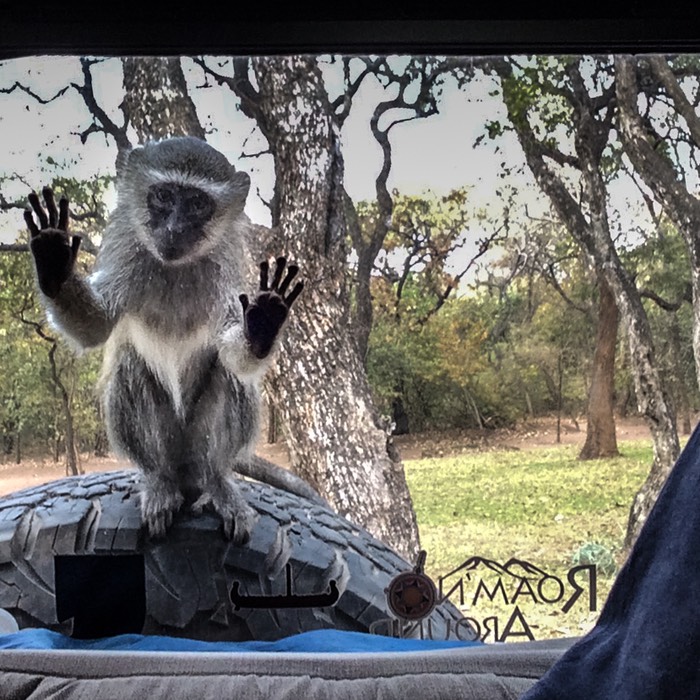
We are never totally out of food; of that we can assure you. However, as we’ve commented before, fresh produce is always available here in Malawi but staples such as bread and cheese and reliable meat are far scarcer, and we’d reached a point in our travels where we were starting to scrape the bottom of the barrel. So we temporarily left our delightful meander along Lake Malawi and headed west to Lilongwe, the capital of this pleasant country and home to the holy grail of the overland traveler — real supermarkets.
On arrival, we heard that Lilongwe had been scheduled for demonstrations, but that “they were canceled for today — not until Friday” — so okay; we’d be sure to be gone by then! The demonstrations we’ve seen occasionally here in Malawi have been in protest of recently held elections and the contested results thereof. We don’t know the details of course, but we could see the Malawians were upset and trying to do something about it. We hope they have some success.
Lilongwe is a place for shopping, rather than playing tourist. But we like it there. We stayed in a nice forested area in the middle of the city. It was very pleasant, and even had troops of monkeys that would wander through, creating chaos on a grand scale and enjoying the Tiger as a jungle gym. They were great and it would turn out to be not the only time in this message that we would be providing the entertainment for locals.
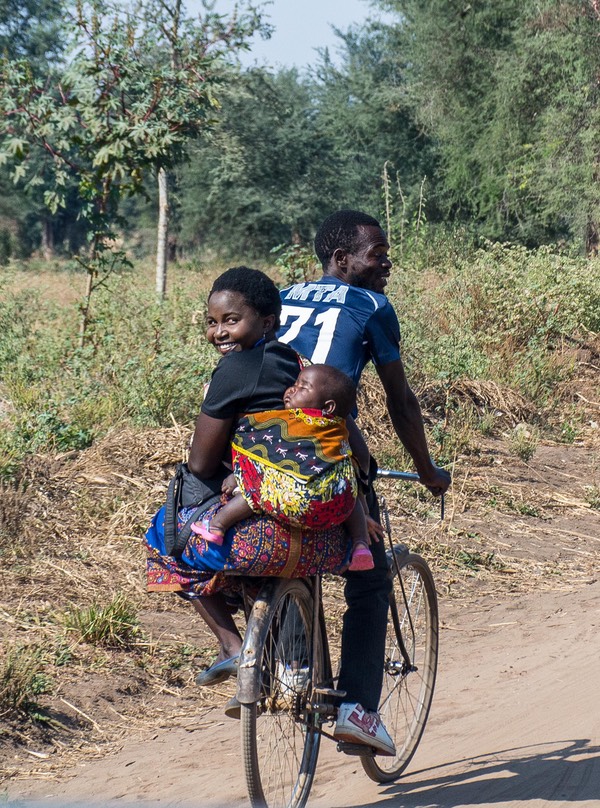
After a couple of days we were starting to get a feel for the city. There was the usual chaos of the streets, but Rick is a fine driver in the cities. Drives like a real local; nothing could faze him. Made me really proud! There are always lots more beggars in cities, and this one wasn’t lacking. What was a bit unusual was the number of them on crutches with apparent birth defects more often than injuries; misshapen rather than missing limbs. Many times we watched as they would slowly and painfully cross a busy intersection; surprisingly, people wouldn’t necessarily slow down, but the drivers were careful and we never saw anyone in actual danger.
As with all towns, fresh produce was available everywhere along the streets; along with pots and pans, rice/maize/beans for sale, clothing, batteries, tires, and huts where you could buy or renew your phone minutes. As for groceries, we already knew that we’d be able to find what we needed. At the mall where the Shoprite and Food Lovers were we tried a small restaurant called Coco’s and were totally amazed. Certainly the best hamburger we’d had in Africa for Rick and a wonderful chicken curry for Kathy. Wow!
At the border into Malawi, we had already known we probably would want to extend our 30-day visas for a second month. We didn’t want to be hurried. So we had asked and were told it was easy to do. This proved to be correct, once we’d found the right office. No surprise — it was located in a busy governmental building that was a former who-knows-what and now falling apart. There was no decent parking, particularly for a truck, but a fellow who was washing cars in the parking area came to help and got us squeezed in beside a small lunch counter; we took up its entire open space and they may have had to move some chairs and tables to make room for us.
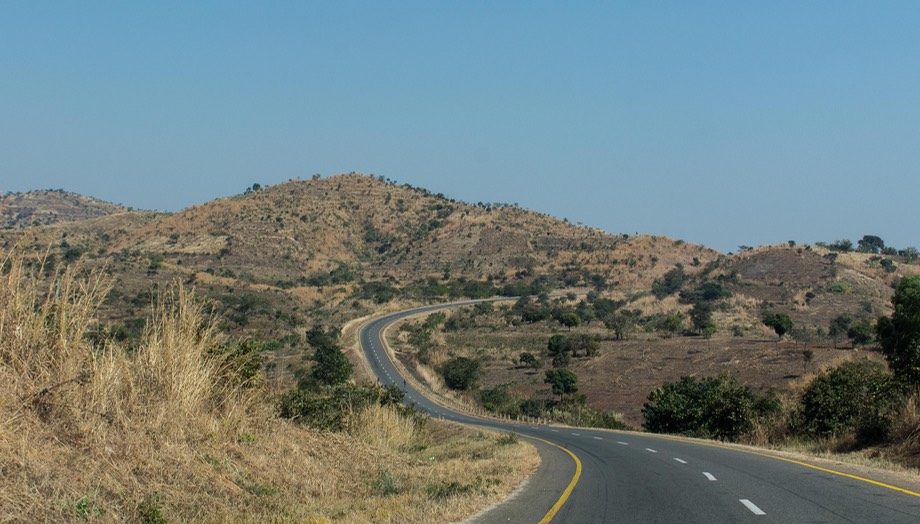
We got stopped just in front of one huge hole in the pavement and beside a water ditch about 2 inches from the right side; had to get out through the driver’s seat. Our helper actually fell in the ditch as he was guiding us in, disappearing from view in front of the hood — but he popped right back up again smiling and laughing. He was a really nice guy. After we got the visa extensions done, the same fellow helped us get out again. He got a nice thank you tip from us! Such a hoot — rather exhausted, we went right back to Coco’s for a second day’s lunch.
While in the city, we still needed to find a pharmacy. We had one set of pills that would run out soon and we also needed some more malaria pills, which are readily available but quite expensive. The problem was one that’s quite familiar to anyone who has traveled very much in these countries. Pharmacies, along with fuel stations, smaller grocery stores, many lodges, and most everywhere else — won’t take credit cards. We tried to find a pharmacy that would, but finally ended up stopping at yet more ATMs. As mentioned earlier, every time we arrive someplace with ATMs we seem to spend most of our time getting cash in order to take care of business. It took us two pharmacies and two ATM stops to find what we needed, but we were successful in the end. And then we beat feet out of town, heading back toward the lake.
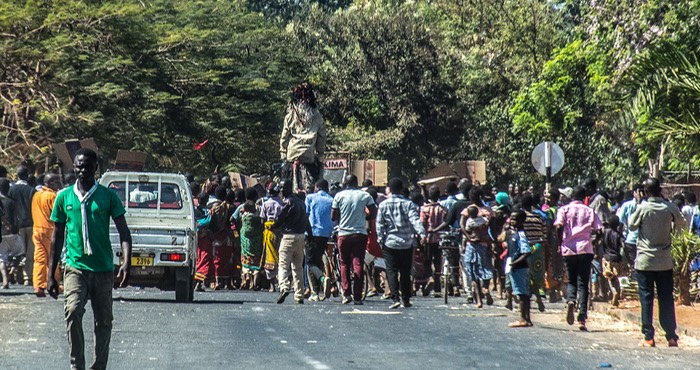
We drove back down out of the mountains, heading east again past the Kuti Game Farm and toward the town of Salima. Suddenly we came upon a huge parade of folks marching and dancing and doing we weren’t quite sure what! A demonstration? A celebration of something? A religious festival? Leading them were people in costume; there were loudspeakers atop accompanying cars, and it was quite something.
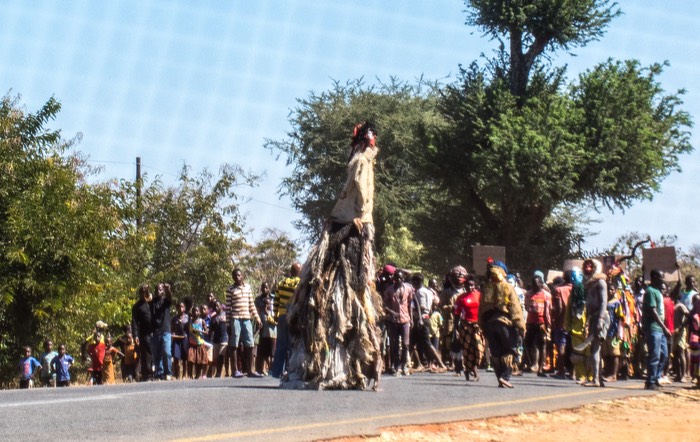
It being a very dusty road, it was quite hard to see, and we were far back in the pack of cars hoping to get past. As we reached the outskirts of Salima, someone who knew the area led a lot of us off the highway and along a dirt road through some housing, and finally back on the road ahead of the parade. We looked back to check it all out, but there was so much dust in the air we still couldn’t see much. All the cars were moving rapidly away from the procession, and we followed suit.
The next day, in talking to a local, he said it couldn’t have been a demonstration, as Salima wasn’t scheduled for one for several more days — such organization! Later on we visited a museum with ceremonial masks, and were able to confirm that we’d seen a religious procession celebrating something. We had seen some similar costuming in other parts of the country, so this made sense.
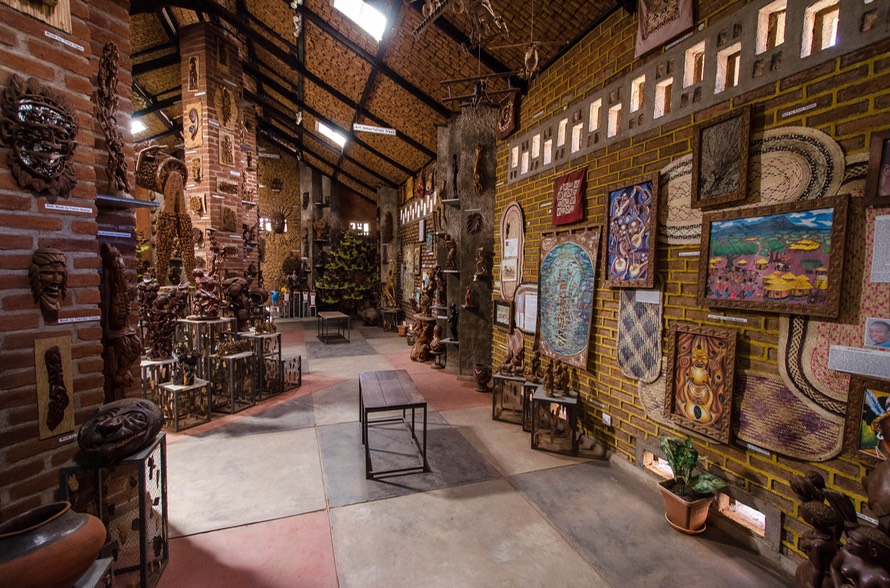
We had been told that when we got south of Salima to be sure to stop in the little town of Mua, and to visit the mission there. Pulling in, we were greeted by a large, Spanish-style mission on a hill, with interesting buildings nearby.
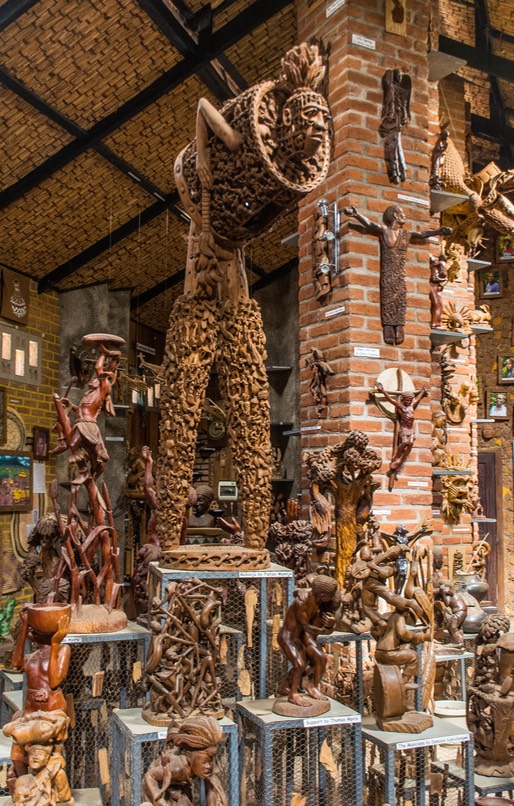
It turns out that the mission is great; built in 1902 and much of it similar to the ones in California, although built of red brick.
But the real treat at Mua is the artist’s colony there. It was fantastic. This is a very stylish place; there is a showroom with wonderful art for sale. But even better is a building with artists at work, a museum of ancient ceremonial masks and a lovely gallery of the best of the art that has been created here. We had pulled in late and they had a place where we could park for the night. We spent 2 hours the next morning, visiting the facilities and drooling over the artworks. Mostly done in wood, there were also paintings and textiles. It was fabulous and we don’t use that word often.
Mua was hard to leave, but finally we took off, still moving south and wanting to get back to the lake. We headed for the M10 turn-off towards Cape Maclear, which is on a point that sticks out into the waters of Lake Malawi near the southern end of the lake. A favorite of overlanders from everywhere, there are many nice spots where you can camp and enjoy the waters. Many stop at the town of Monkey Bay, but we were headed for a little place at the end of the road out through Cape Maclear NP and towards the point, a spot called Chembe Eagle’s Nest.
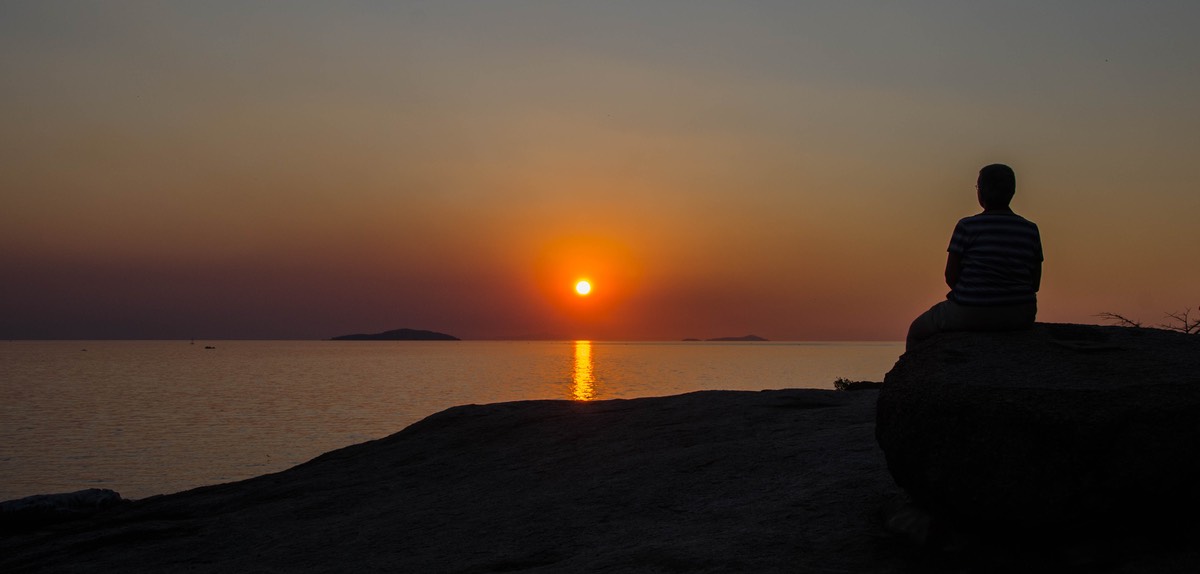
Eagle’s Nest is a small area, with just enough room for a few trucks to park up under some trees and among the rocks near the lodge. We were able to squeeze in, after a fair amount of maneuvering, and therefore were in no hurry to leave again. We stayed a couple of days, enjoying the sand and the beach and the views out over the bay. And most enjoyable, there were incredible sunsets. You see, all this time we’d been driving down the west side of the lake (the east side is shared by Tanzania in the north, and Mozambique in the south) — and now we were finally at a better angle. Each night the view was even more terrific. Just marvelous. We never saw any eagles though.
We had one more spot we wanted to stay at, still further down towards the bottom of the lake, called Palm Beach Resort and Campsite. And we sure came on a great place there. This is a very casual resort under the palms, very unstructured (“park anywhere you want”) with lots of action. Not so much organized tours or anything like that, but here was a group of young Dutch students, here to build a house in the local community. They worked hard and played hard — water games in the pool, etc. There were also the locals. We were parked near a path down to the lake so they came and went all day, every day — getting water, washing clothes, kids playing in the sand, boats going to and from fishing expeditions — all the time. They were curious about us, but never intrusive, and never begging or selling things.
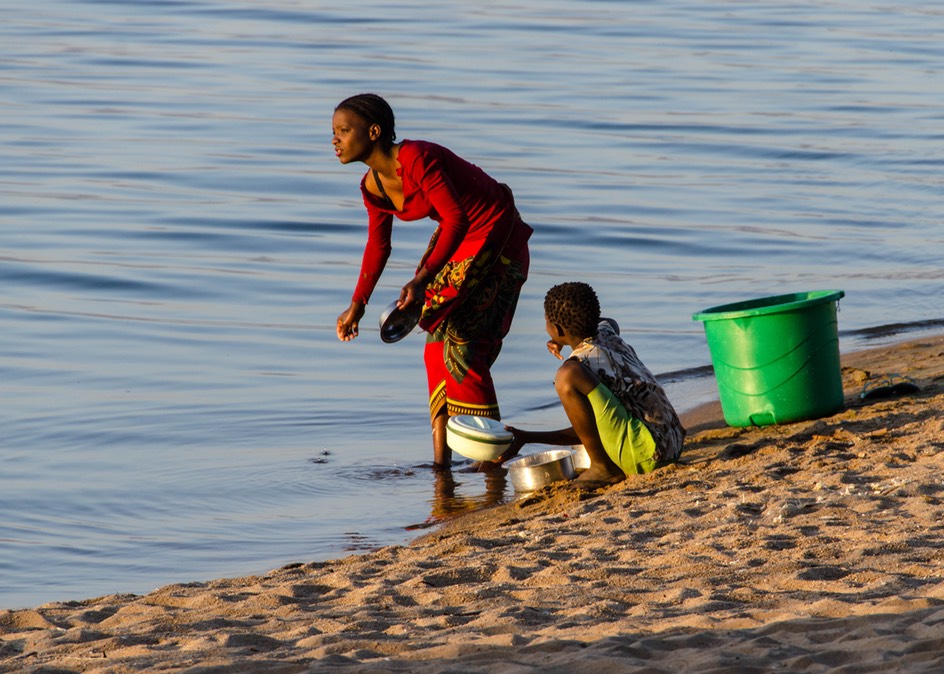
Watching the students at work, we were reminded that Malawi as a country is no perfect place to live, particularly for the rural people. The country is very poor, and relies heavily upon foreign humanitarian aid. Much of the clothing we see is obviously donated (“U of Tennessee” on t-shirts). There are food kitchens, child care/orphanages, etc., all operated by foreigners. It’s all provided very lovingly, and is essential to the well-being of the communities. But will this be necessary forever?
As always, the best weather in Malawi is along the lake. A constant breeze, plenty of shade from the nearby trees, that’s all that’s needed. We really enjoyed our time here among the palm trees. But time was passing, and by now we’d made contact again with Win and Petra, German friends we’d first met in South Africa almost a year ago. They were leaving Zambia before long and heading in our direction; we made arrangements to meet up with them at a spot near Liwonde NP, further south. Suddenly we had plans, so off we went.
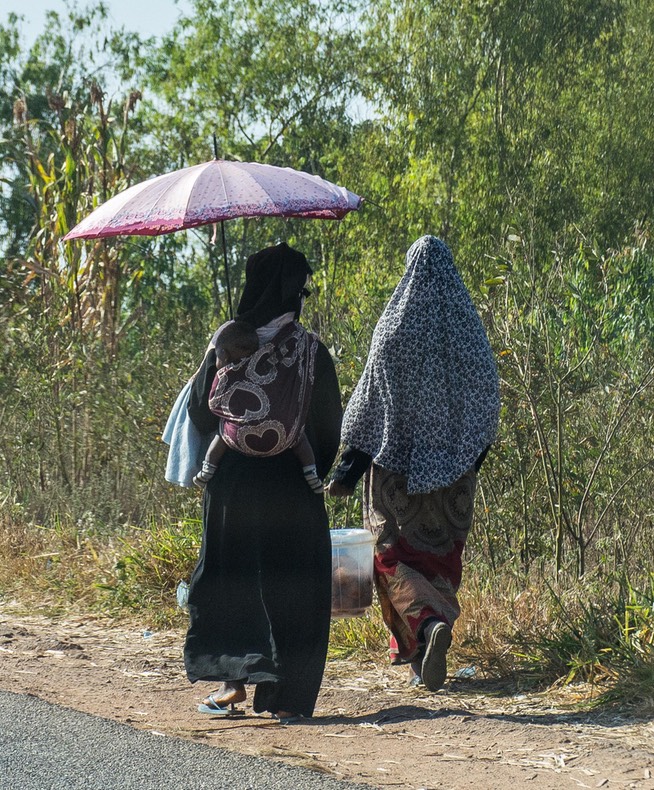
Here in southern Malawi, we are starting to see more Muslims, evidenced mostly by the presence of mosques along the road, together with head scarves and more conservative dress. People were a bit more reserved, not quite as quick to wave and smile as we passed. It was great to see the women’s lovely dresses, and their head coverings spread out over their backs, as they cycled along. We wondered if this change might be associated with our closer proximity to Mozambique, which we understand has a very large Muslim population.
Not far south of Palm Beach you reach the end of Lake Malawi near the town of Mangochi, where the lake becomes the Shire River; you go past dams and runways and pipes — this is the source of water and electricity for a huge area. Keep on going; at this point the road starts to get a bit rougher as you go past smaller Lake Malombe, and then further down you reach the small town of Liwonde, the gateway to nearby Liwonde National Park.
Liwonde is big enough for some stores, which was nice, but we knew our best bet for shopping was in Zomba, an hour or so further along. We anticipated staying for several days in this area, so we trekked on and climbed up onto the base of the plateau where Zomba is located. We did a good explore of the town’s offerings (including an excellent open market), had a nice lunch at a local sort-of-Italian restaurant called Dominos (no relation), and returned to Liwonde.
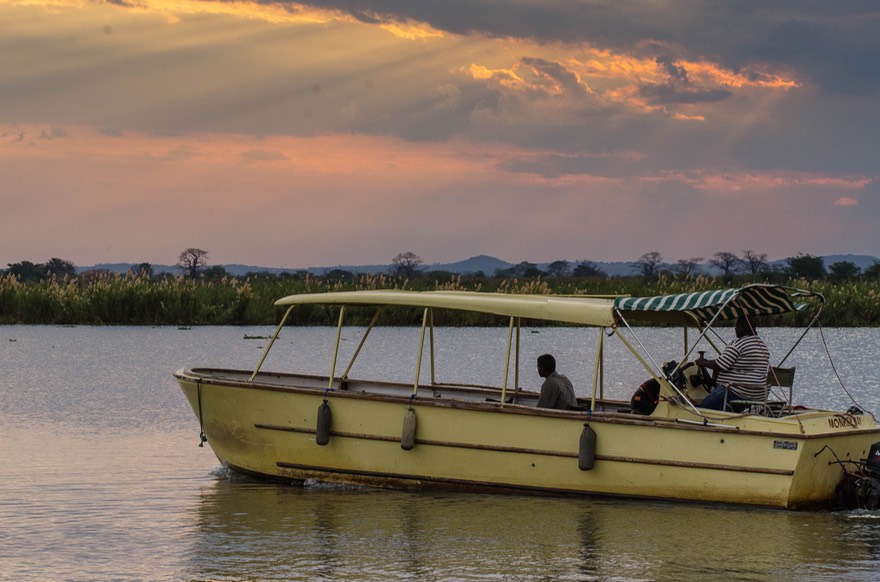
We had arranged to meet our friends at Liwonde Safari Camp, which is part way out the dusty and rocky road toward the entrance to the national park, and a good rendezvous spot. We liked it here. It’s larger and more open than much of what we’d been to in Malawi, and we could stretch out a bit. We did laundry, took showers in one of the nicest outdoor shower facilities we’d ever seen, made friends with some of the staff, and generally enjoyed ourselves in a very pleasant spot. One member of the staff was a young woman named Bella, who was born in Malawi and has lived there all her life other than when away at university. She was great to talk to and we learned a lot from her about this country we’ve come to appreciate so much.
The first day or so we were there it was actually quite hot, but then that afternoon a heavy rain came through, giving the Tiger a nice bath and cooling the temperatures a bit. We had to scurry
around closing windows, bringing chairs inside and taking in laundry. We hadn’t seen rain in months.
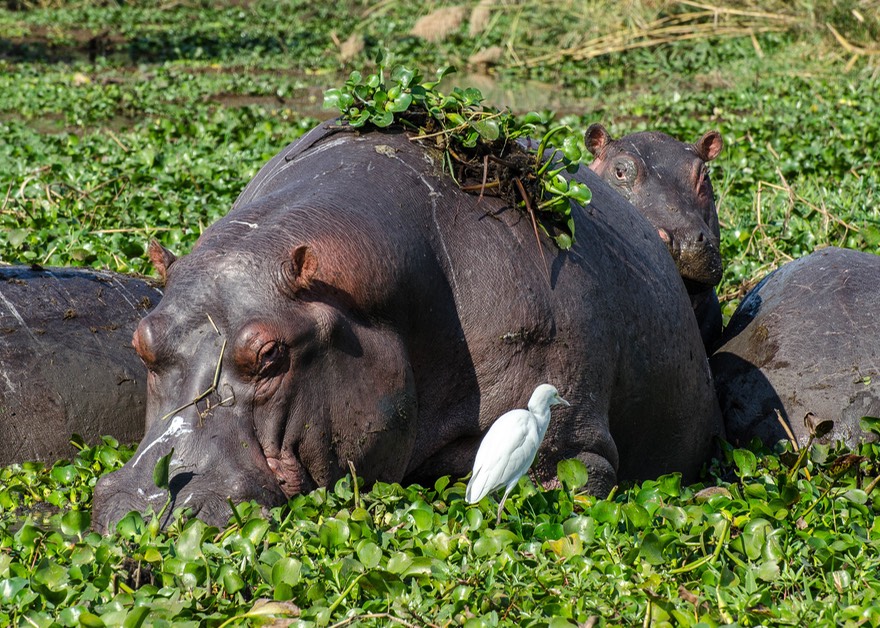
One afternoon we took a great boat ride out onto the Shire River, which runs through the national park and is one of its major attractions. What a treat. There were hippos close enough to scratch their backs; lots of water birds; amazing crocodiles — motionless until ‘poof’ and they were gone (they run really, really fast) — and, the ultimate: elephants right along the shore. We surprised one fellow; he lunged forward and scared us all and we flopped back into our seats in the boat and he backed up a bit, snorting away and flapping his ears as he began moving back into the brush. Great fun. An added treat for us was the first sighting in several countries of the beautiful green/yellow fever trees that lined the river banks.
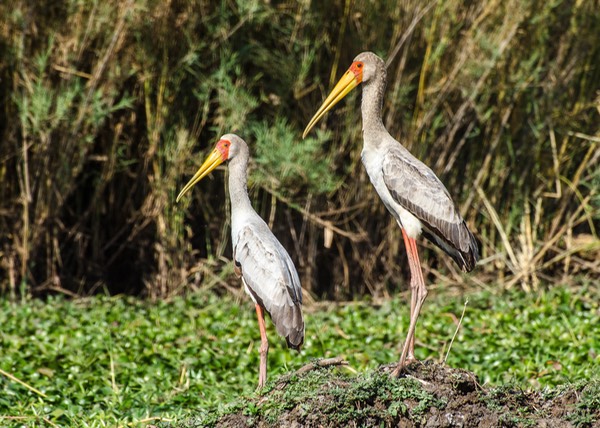
Win and Petra spent a couple of days up in the park at another camp before joining us, then we settled in for a fair giggle and lots of chatter about future plans, accompanied by a swell meal in the lodge restaurant before parting ways the following mid-day. What a great couple they are; good compadres, and wonderful travelers that’s for sure. But off we all went — we headed back up into the mountains of the Zomba Plateau, while Petra and Win went off to explore the pleasures of Lake Malawi. Don’t know if we’ll cross paths again.
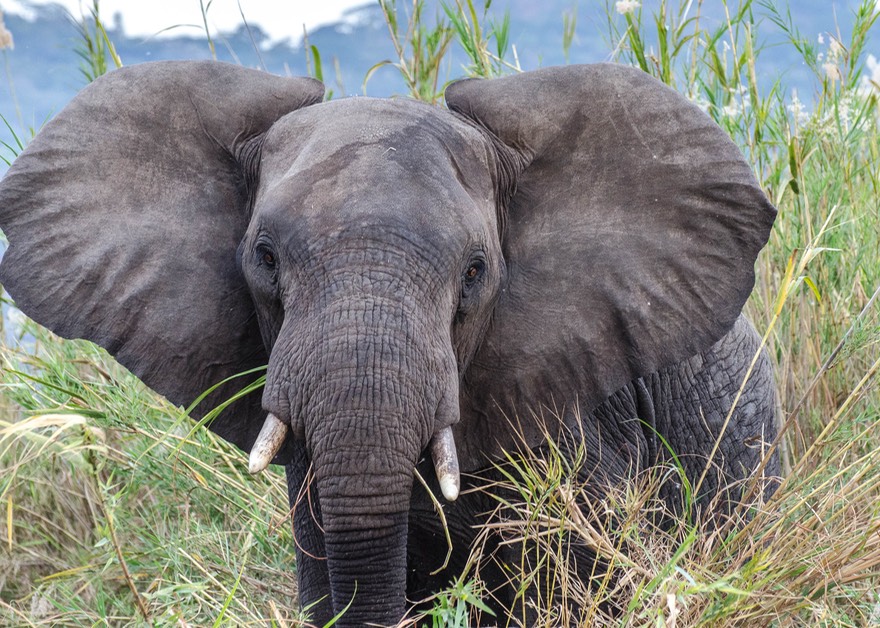
Heading back up to Zomba was an easy choice for us. This is a small city and university town that we really enjoyed on our first run through a few days earlier. One of the great little things about this town is that reggae music is really popular. You hear it everywhere. We thought that was great. Also, being a university town and a regional governmental center, it’s more sophisticated than many; this was the first place in Malawi we saw women who were really dressed up. They looked just great!
I cannot overemphasize how much pleasure I took in poking around in the outdoor market. It reminded me a lot of the markets we’d enjoyed so often in Central and South America. Taking over an unused space full of rabbit holes with produce and clothing and machinery, etc. — for the asked price or the negotiated price or left behind because no one could come to an agreement, but never any hard feelings — and “I don’t have it but come with me and we’ll find it for you” as opening gambit. It was great fun.
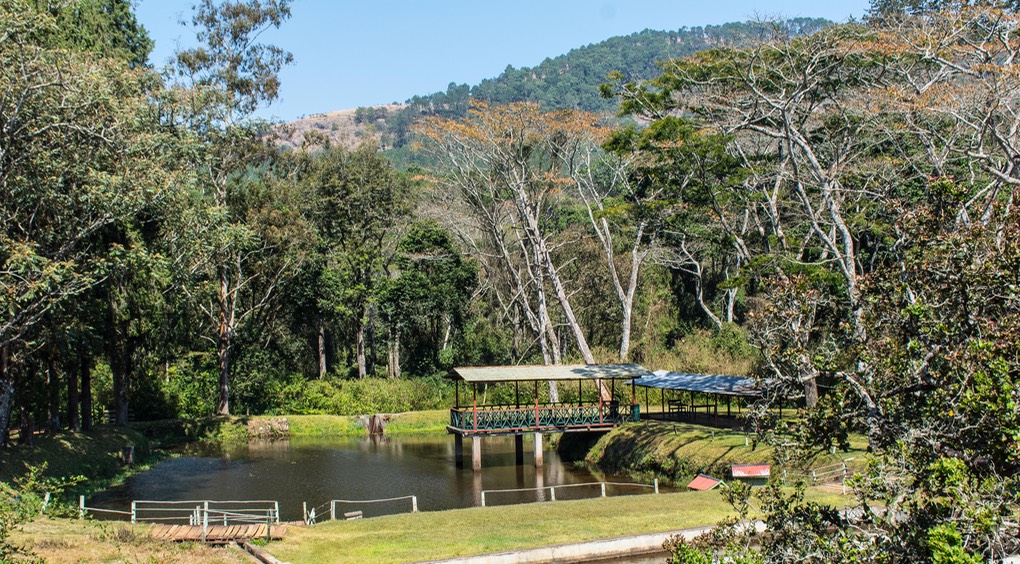
The strawberries were to die for. Also the raspberries, papayas, and the avocados and the greens and tomatoes and…and. You could buy ears of corn, or maize, or unground kernels. Open baskets of various kinds of beans, or buckets of potatoes or apples. And, of course, the bananas. Huge hands of 12-14 small ripening bananas so delicious you wanted to eat three of them, right now. You must come see.
Well, we were there to shop, but we also wanted to spend some time up in the forested hills. The town sits at the base of the Zomba Plateau. To access further up, you take this winding road that leads to the top, where there are walking and hiking trails. There are also people selling much of the same produce you saw in the market, standing along the roadside, ready to package up whatever various items they’d enticed you to purchase. We drove up until we found the spot we’d been looking for, a nice open park that had camping on site, the Ku Chawe Trout Farm.
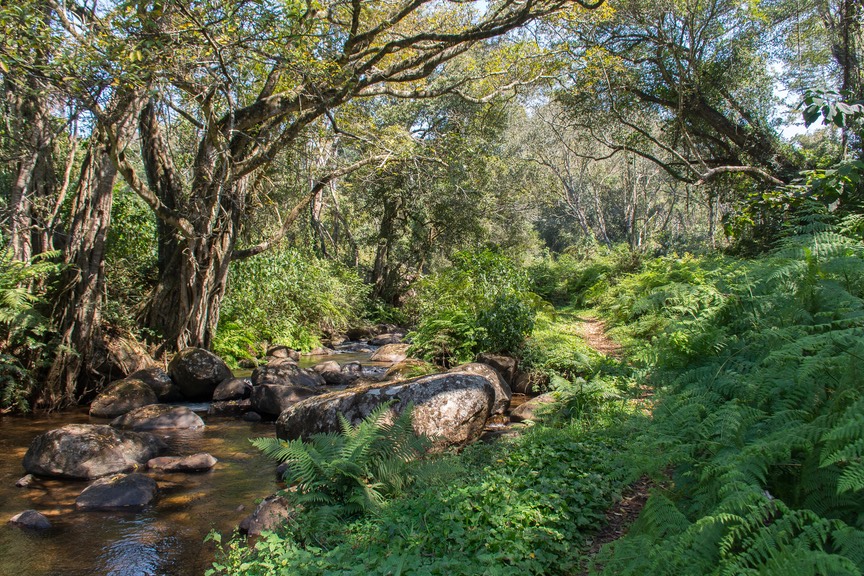
The Trout Farm had been created some time in the past. These days the ponds are there, but no fish. There is a stream to investigate and lots of hiking in the park area. It was truly great; we spent several days enjoying ourselves — and eating up much of the wonderful fruit we’d just purchased. We had lovely views and nice forest to enjoy. We could listen to the water from the stream, flowing along through the ponds and then on down the hill. It was delightfully green and cool, at about 1500 meters in elevation. Not too shabby.
Moving on once again, we stopped back down in Zomba again. We needed more strawberries, to say the least. In town, we even spotted a bakery, and were able to get fresh supplies there. The one thing Zomba doesn’t have, sadly, is a decent grocery store. It can be quite difficult to get dairy products; just the odd bit, but even that can be scarce. Our theory is this is due to the lack of electricity throughout the rural areas. How can you have a dairy case if there’s no way to keep the stuff from spoiling?
We had one last major stop we wanted to make in Malawi before we started towards our next adventures. Bella at the Liwonde Safari Camp had urged us to go further south and explore the tea plantation area around Mulanje. We had read that it was supposed to be beautiful down there, and Bella wanted us to go and see for ourselves. She said it was her favorite spot in the whole country.

The Mulanje Mountain Forest Reserve in southeast Malawi is known for the scenic beauty of the mountains themselve,s as well that of the surrounding tea plantations. It is a really beautiful area, even in August when the farmers are burning the fields and the skies are hazy. We can imagine that at a different time, just after the rains when the air is clear, these mountains could be really spectacular. It is also known as a great area for hiking; we had seen many signs for “guides and porters” as we drove along. We came for the scenery and especially to enjoy the beauty of the tea plantations.
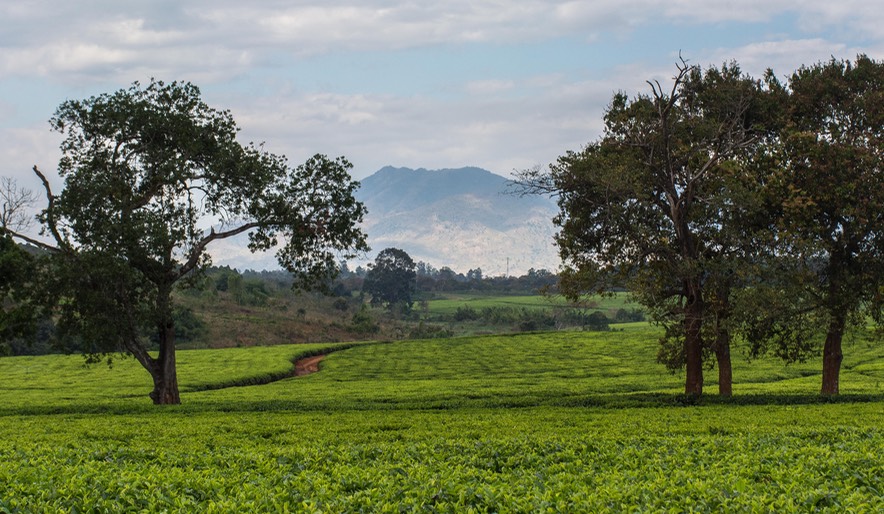
We drove down from Zomba and stayed a few nights at the Africa Wild Truck Lodge & Campsite on the southern side of the mountains, about 20 kms southeast of the town of Mulanje and very near the eastern border crossing with Mozambique. This was a good choice. It is a lovely spot located on the edge of a working plantation. There’s even a lively elementary school right next door supplying plenty of cute kids to observe and enjoy listening to. We could walk out among the tea bushes and see them in various stages from new seedlings to mature, producing plants. Some sections had fully grown plants that had been cut back to encourage fresh growth and others had been cleared and were awaiting replanting. A tea plantation is a beautiful sight. The plants are a vivid green and trimmed smoothly as a result of the harvesting of the tea leaves off the top.
Other travelers had told us we should be sure to continue on around counter-clockwise, and take the loop road all the way around the mountains in order to fully enjoy the views, so we wanted to do that. In retrospect, scenically it wasn’t really that worthwhile given the hazy air; but still it proved to be an interesting day, though in a different way than we’d anticipated.
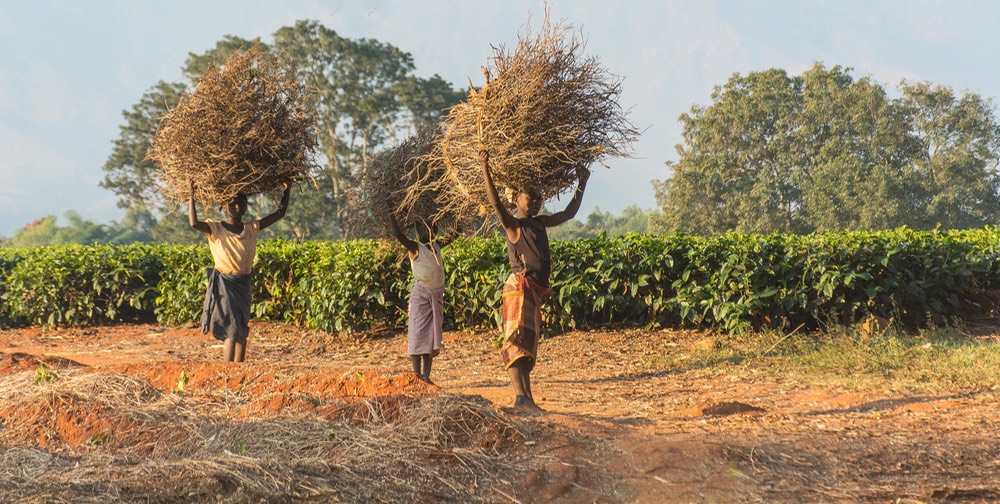
Continuing a trend we’ve been commenting on of late, it seems that, especially here in Malawi, the majority of the population lives right along the roadway. This means that we don’t pass by localized villages separated by open stretches of road, but instead see pretty much a steady stream of small houses interspersed with occasional shops or bicycle repair places, and all with a constant stream of pedestrians and bicycles and motorcycles moving on about their business. The result for us is that we might go many kilometers between finding a place to pull off the road for lunch or to take pictures or to simply take a bit of a break. It actually can get pretty intense having so few opportunities for the driver to just relax and catch his breath from time to time. Anyway, this loop road was like that.
We began, after driving a short distance from our campsite, by actually coming within sight of the border crossing to Mozambique. We knew our left turn would be close to the border, but when we missed the turn and found ourselves coming right up to the border post we made sure to turn around asap before someone thought we were looking suspicious by approaching too close and then turning away. We found our little turn off on the second go around, and headed off on the loop with the pavement ending right away as we embarked on what would end up being 40 kms of dirt road.
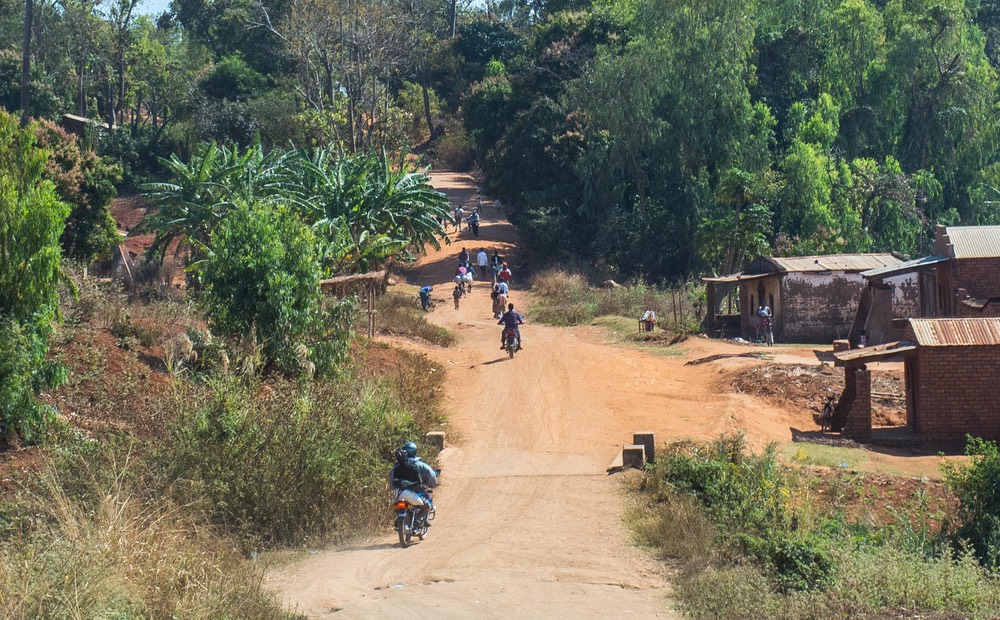
We’ve mentioned many times already that the dirt roads in Africa are giving Team Tortuga a bit of a pasting. They typically are not overly corrugated and they don’t usually have many sharp rocks to avoid. What they do have in abundance are deep ruts, potholes, and large rock outcroppings from the road surface. As we’ve mentioned in our last two messages, therein lies the rub, literally. La Tortuga, being a sort of tortoise after all, is just a bit low slung for these conditions — he sometimes rubs his belly along the road surface. Doing this will range from being something of a distraction for the driver and passenger to becoming a full-on disaster. And so it was on our loop drive around Mt. Mulanje; in spades.
We were doing just fine, going slowly and trying to avoid the worst places, when we came up on a… well not actually a black hole or anything, but a pretty deep depression covering most of the road. It probably wasn’t as bad as it looked, but approaching it we stopped the truck and both expressed some concern. It was clear that other drivers had felt the same because, as is so often the case, there was a widening of the road where they had driven around the hole. This seemed like the best option and it all looked good so we began to edge left around the obstruction.
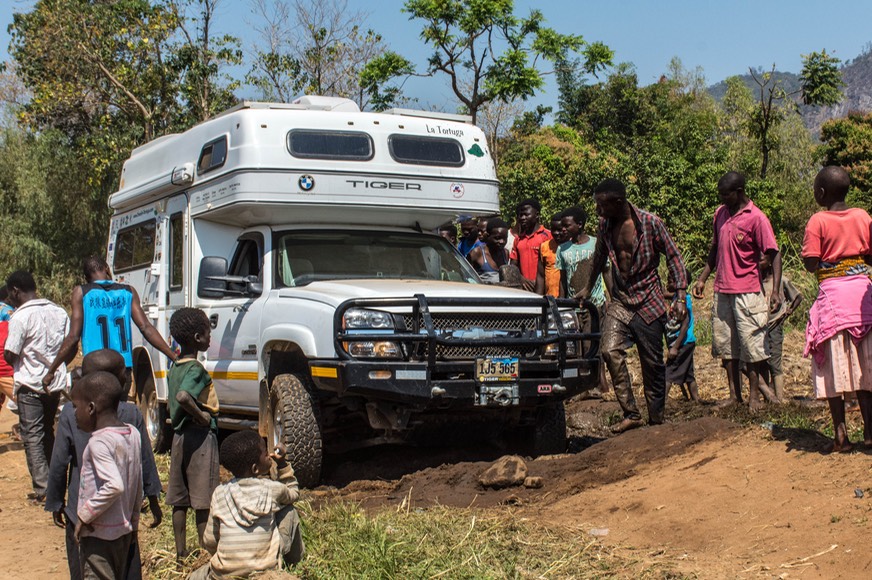
Well, you can see right where this is headed can’t you? The truck sort of sagged on the left side and our forward momentum was lost.
Humph! Says Rick, time for a shift into four wheel drive — that’ll fix it.
Spinning noises ensue.
Humph! Humph!! (pronounced Double Humph if you prefer) He mutters, we’ll have to try low range.
Same result.
Merde!!! Our day changed just like that.
It turned out that there was a fair channel of water running right along the side of the road. Not enough to be that noticeable but enough to soften the edge of the roadway. Tiger is heavy and we sank in.
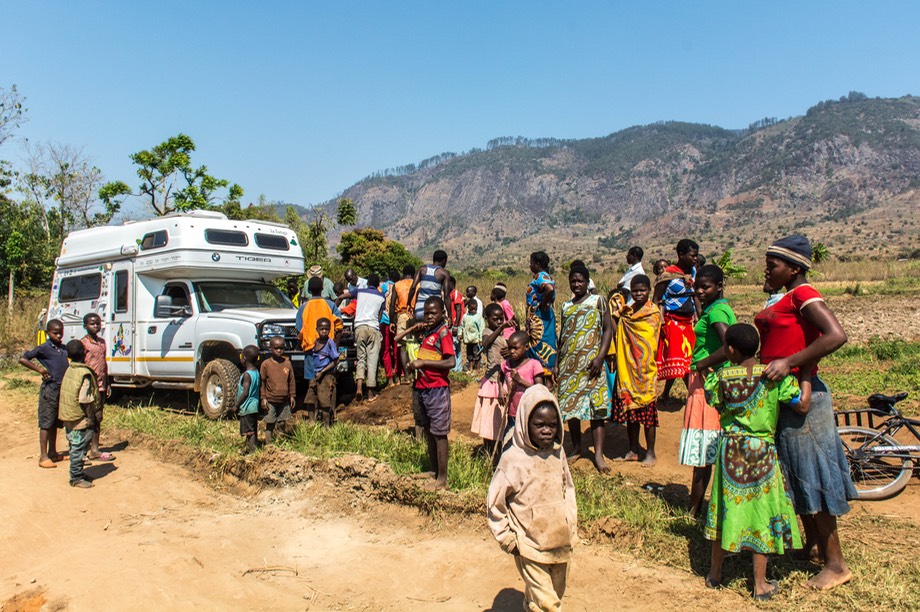
Then the most amazing adventure began. The very first person coming past, on a bicycle, stopped immediately and came to lend a hand. Before any time at all had passed there were more men stooping down to see what should be done; along with children and their mothers and just folks of all ages. Crazy white people had come along to enliven a dull Sunday afternoon. It felt like in a musical, where all of a sudden some one on stage yells out, “Bwerani aliyense, tiyeni tikumbe galimoto yayikulu” (Come on everybody, lets dig out the big truck”, in Chichewa). Before long we had at least a hundred local folks crowded around to see what was going on, with a dozen or so men doing the bulk of the work and everyone else watching and visiting and enjoying the afternoon’s entertainment.
It was a real mix of activity and pretty interesting to watch. A couple of the younger fellows could speak a little English, so they did what they could to interpret, but mostly guys just dug in; they’ve all done this before and there really isn’t anything very technical involved. As usually happens, we were not in a position where we could hook our winch to anything, so there was no help to be had there. We would have liked to hook onto a passing truck, but there were none of them around. During the three hours the process took, a total of three other vehicles came past and they all declined to stop to help; two were heading to a funeral and one to a meeting of some sort. So the winch was not helpful.
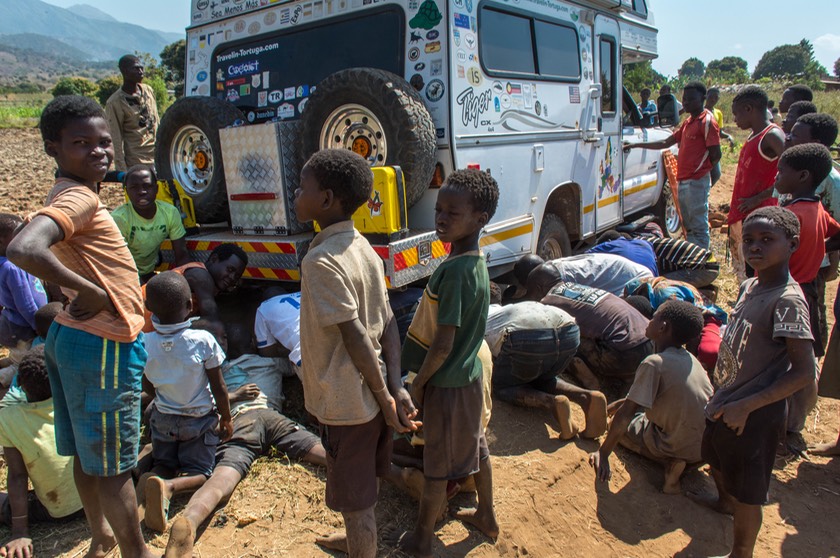
It became clear right away that the left side tires had sunk in enough to have the truck’s undercarriage laying on the road surface; there was general agreement that some of this had to be dug away. Then of course they worked to dig around the two tires in order to get either some rocks or our sand ladders in position to give some needed traction and to lift the truck enough to clear the undercarriage. One of the very first things they did was to dig a diversion channel ahead of the truck so the water coming down the side of the road would be routed out into the adjacent field before rejoining the regular channel behind the vehicle. There was a lot of discussion as to whether we should try to back up or go forward, so both directions were attempted at first. Naturally the main effect of this was to dig the tires ever deeper into the mud.
Another thing that was immediately apparent was that Rick would have little input into what was happening. They couldn’t understand what he tried to say anyway, and he couldn’t get under the truck to see what they were doing.
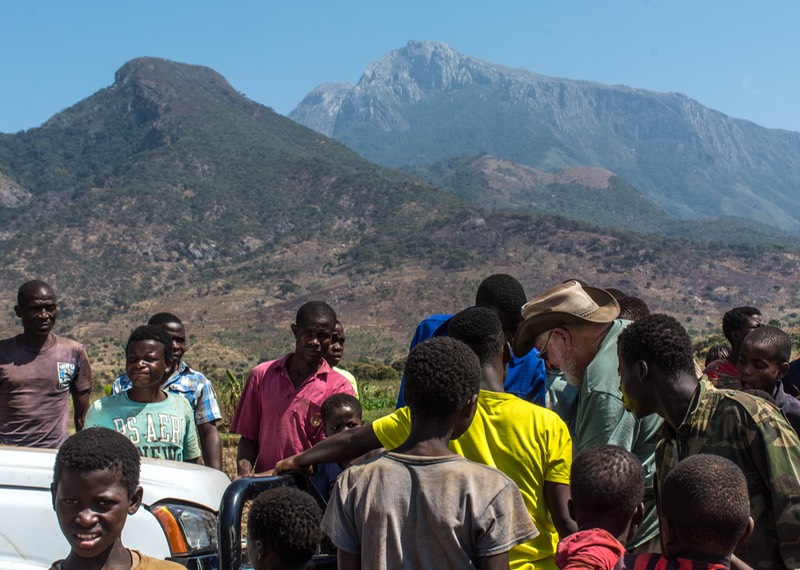
The discussions between the men got very animated at times, but as will always happen a certain chain of command emerged, and after a short time they all worked together well. We provided a jack to lift the truck, and the sand ladders were somewhat useful; however, by the end they were carrying over available bricks to use instead, being more comfortable with their own materials.
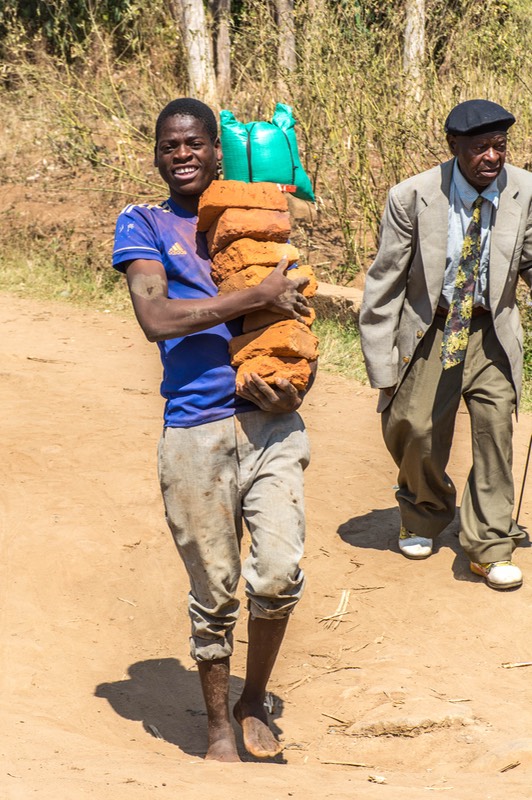
After a couple hours of slow progress, Kathy brought forward a motion to get one of the passing motorcycle guys to approach the owner of a tractor we were told wasn’t too far away; maybe he could come pull us out. This seemed a reasonable suggestion to us, but when word got out it caused something of an uproar from the working men. They made clear through our interpreter that they could do this in their own way and didn’t need any guy with a tractor butting in. So we said OK and they continued working.
Some highlights of the experience:
Our main interpreter said early and often, “It’s OK Boss, don’t worry”. (This was certainly encouraging, though at one point pretty far into the operation, Kathy quietly muttered, “You’ve been saying that for three hours”. You know Kathy.)
Something else he said at one point and repeated at the end was, “I’m so proud of you.” Now we can’t be entirely sure what he meant by this, but it first came after we’d told him we were from America. We know that they aren’t likely to see very many white folks coming by on their out-of-the-way road, and we also know from talking to many people in Africa that there are not many independent travelers from America at all. Tour groups and safaris in some areas sure, but not out alone on a country road stuck in the mud. So we’re pretty sure he was telling us he was happy to see us there and happy that we’d come to see his community. We find that very touching.
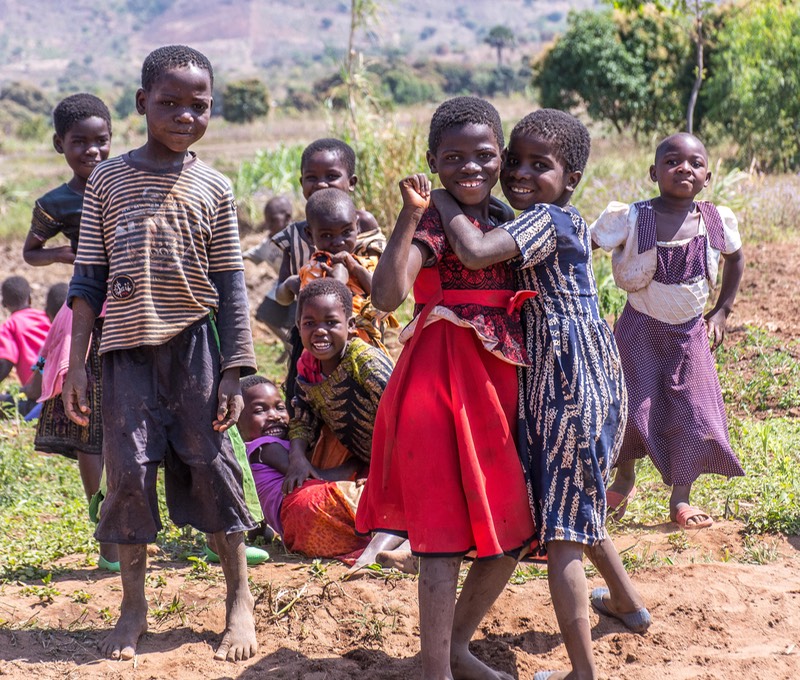
While Rick was staying pretty close to the action — or trying to as you’ll see in the photos — Kathy had more of a chance to take pictures and to interact with the women and the kids, which, she says, was a real hoot most of the time —
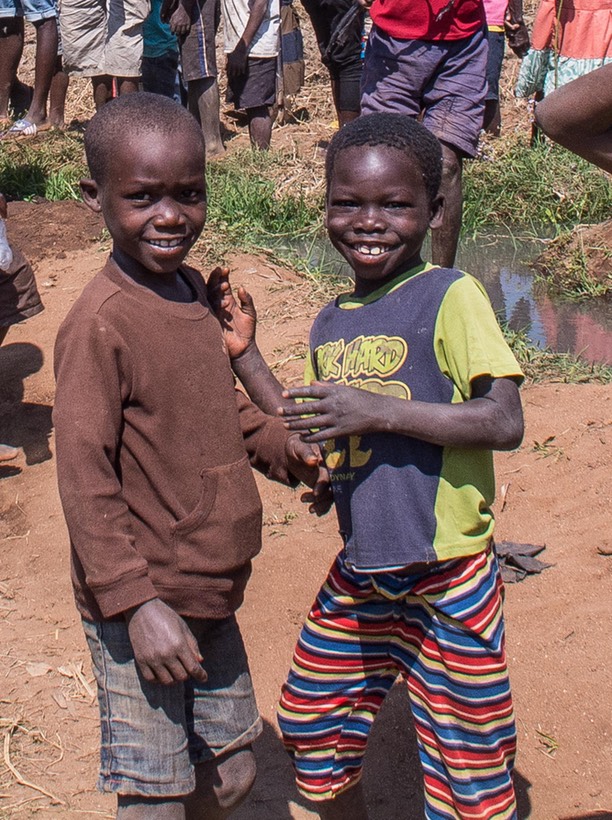
The children were the first to arrive, in small groups at first, but in a motley mob by the end. They were delightful — inquisitive, some wanting their photos taken and others too shy to come near at all. Then the mothers came to check on them — and stayed for the duration. Everyone would peer in the windows to see inside, but they never asked to come in. I had short exchanges with many of the women; they spoke little English but would talk at me and laugh when I indicated I didn’t know their language. But, as always, we did just fine. I admired their hairdos, which made them giggle; and their clothes, which they liked too. I had an interesting exchange with an older woman, who did know some English. She asked me my age, and when I said I was 75, she gasped. She said she was 47. We both could see what life had done to her, in comparison. I gave her a big hug and we smiled.
The men stayed with the truck, except for a few older ones, who did come up and talk to me. Frankly, I suspect many people at the scene could speak some English. But as we all know, it takes a lot of confidence to speak out in a foreign language, particularly if you’ve not had a lot of practice. People who asked questions were interested in where we were from and where we were headed. They enjoyed looking at the map on the side of the truck, and also in reading the information along the roof line: North America — 2001-06; Central & South America — 2007-09; Europe — 2010-15; Australia & New Zealand — 2017-18; Africa - 2018-?.
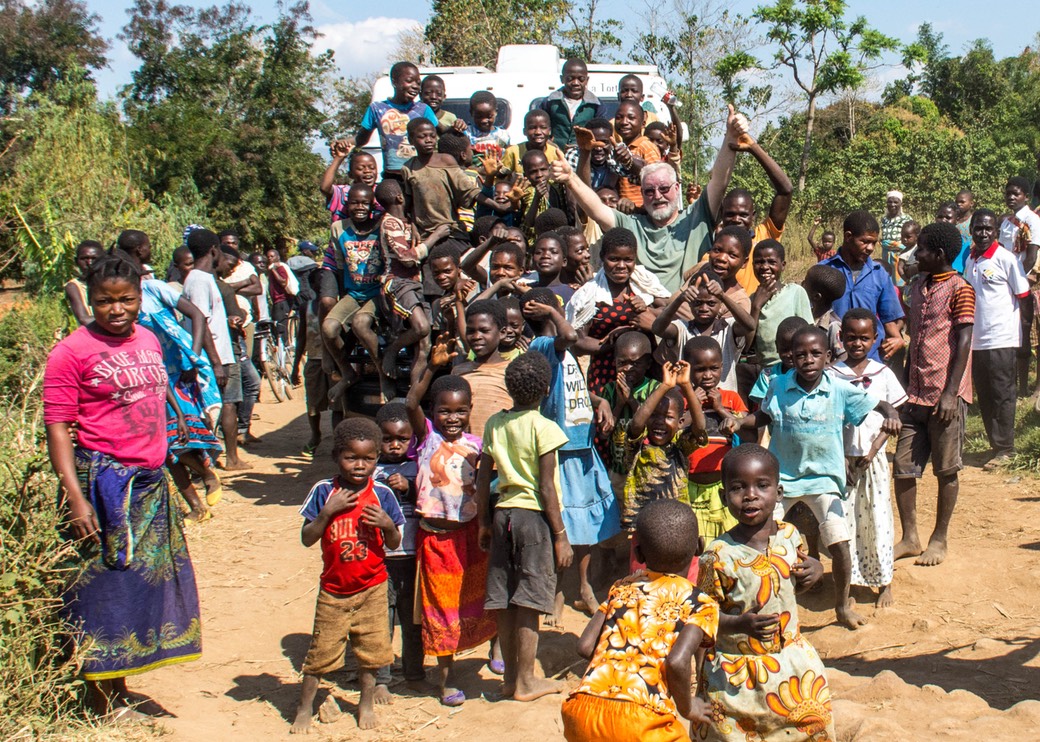
Finally, after three hours of work, with as many people as possible pushing from behind and on the sides, the tires caught at last. The Tiger lurched forward and with much cheering and honking of our horn we were free. It was a good moment on many levels. Naturally we were very happy to have gotten out of trouble with no damage to the truck and to be back on our way.
But we were equally delighted by the whole experience and the way it had evolved. Everyone we’ve had any interaction with in Malawi, almost all of them black but also the very few whites we’ve encountered, have been so, so friendly and gracious to us. Happy to see us, happy to help us, wonderful attitudes all around. We’ve never had a sense that someone was just being friendly in order to sell us something or because their boss has trained them to be that way; they just seem like happy, friendly people and we’ve been enjoying them a lot.
Of course we happily gave the men some money for all the effort they had expended. Two people, one of them our interpreter and the other one of the older fellows who’d sort of taken charge, were appointed to discuss the amount and receive the money. Rick made sure to make individual eye contact with several of the others whom he knew had done a lot of work, confirming that it was OK to give the money to these two guys. They all nodded and smiled so he had to trust that everyone would get their share. Not knowing that for sure is a bit hard, but there was no way he could have picked out all the right guys and given them each something; so in the end he had to trust in their societal customs to make it right.
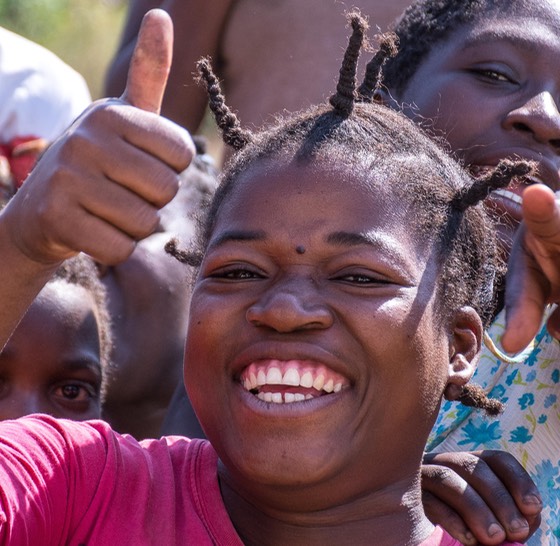
As we try to emphasize so often, this really is the nature of our travel experience. Something good happens, something bad happens, but in the end we learn something from every event and are rewarded with new memories to file away in our minds. We don’t know whether we would have gotten out of this problem if left entirely on our own; we like to think so, but this was a toughie, so who knows. The real point is that we weren’t all on our own, but had the immediate and unquestioned assistance of a whole bunch of strangers. Just like we’ve had in each and every one of the other times we’ve gotten ourselves in trouble out on the road.
Life is good — even when it takes a village to make it so.
Your intrepid traveling friends, Rick and Kathy, and a slightly chagrined Tortuga, newly covered in the mud of Malawi.
Go to the photo page for this story to see more of Southern Malawi